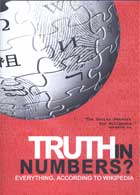
Truth in Numbers 2010
Distributed by Cinema Guild, 115 West 30th Street, Suite 800, New York, NY 10001; 212-685-6242
Produced by Scott Glosserman and Michael Ferris Gibson
Directed by Scott Glosserman and Nic Hill
DVD, color, 85 min.
Sr. High - General Adult
Information Literacy, Popular Culture, Writing
Date Entered: 11/28/2011
Reviewed by Rebecca Adler Schiff, College of Staten Island, City University of New YorkWikipedia, in case you didn’t know (but how could you not?), is the online, open content, participatory encyclopedia that, as described more than once by its founder Jimmy Wales in the documentary film Truth in Numbers? Everything According to Wikipedia, “provides every individual with free access to the sum of human knowledge.” The name and the modus operandi of the enterprise come about from the marriage of Wiki software, which allows visitors to alter content, and a cumulative encyclopedia that can be contributed to by anyone who feels so inclined. Not surprisingly the project from the start has had its ecstatic champions and its vociferous detractors. All that said, Truth in Numbers turns out to be an engrossing film, focusing as it does on the origins, practices, and implications of the Wikipedia enterprise. It’s beautifully shot and elegantly edited, the camera following Wales as he visits both coasts of the U.S. and travels to India, China, Indonesia, Australia, South Africa, and Holland. The film weaves together a series of interviews with Wales as well as with some notable writers, academics, and critics, all the while prompting viewers to ask fundamental questions about the creation and dissemination of information. The film also raises the issue of neutrality in writing, and whether accuracy and credibility are placed in jeopardy when “non-experts” readily create anonymous entries.
Much to his credit, the film was made with Jimmy Wales’s consent, and it doesn’t hide parts of the dark belly of the project. (Also to his credit is that Wales didn’t set Wikipedia up in a way as to personally make him millions à la Google.) Larry Sanger, the co-founder of Wikipedia, who brought the wiki idea to Wales’s attention but who later had a falling-out with him, plays a prominent role in the film. The journalist John Seigenthaler, an early detractor, tells of his battle to have removed from his Wikipedia entry a sentence saying he was somehow connected to the assassination of Robert F. Kennedy. Perhaps more to the point, and again to Wales’s credit, not only do the detractors seem to outnumber the yea-sayers, but they seem to have the better of the argument as well. In particular, journalist and critic Andrew Keen speaks succinctly and skeptically about Wikipedia’s limitations. Nor does Wales help the cause by repeating on every occasion the business about “the sum of human knowledge.”
Appearing also in the film are Noam Chomsky (who finds an error in the very first sentence of his Wikipedia entry), Howard Zinn (author of A People’s History of the United States), CBS commentator Bob Schieffer, and British writer Simon Winchester, author of a book on the making of the Oxford English Dictionary. Winchester, though a detractor, quotes a hideously racist passage represented as scientific fact from the respected 1911 edition of the Encyclopedia Britannica – a powerful object lesson that experts can also get it wrong, and sometimes to dire effect.
Truth in Numbers? is informative, even-handed for the most part, and unfailingly interesting. As for the efficacy of the enterprise itself, like a potent prescription drug that can cure but also alerts to possible undesirable side-effects, the film possesses the virtue of leaving it to the patient – i.e., the Wikipedia user – to decide between the benefits and risks of treatment. Highly recommended.